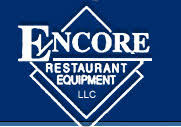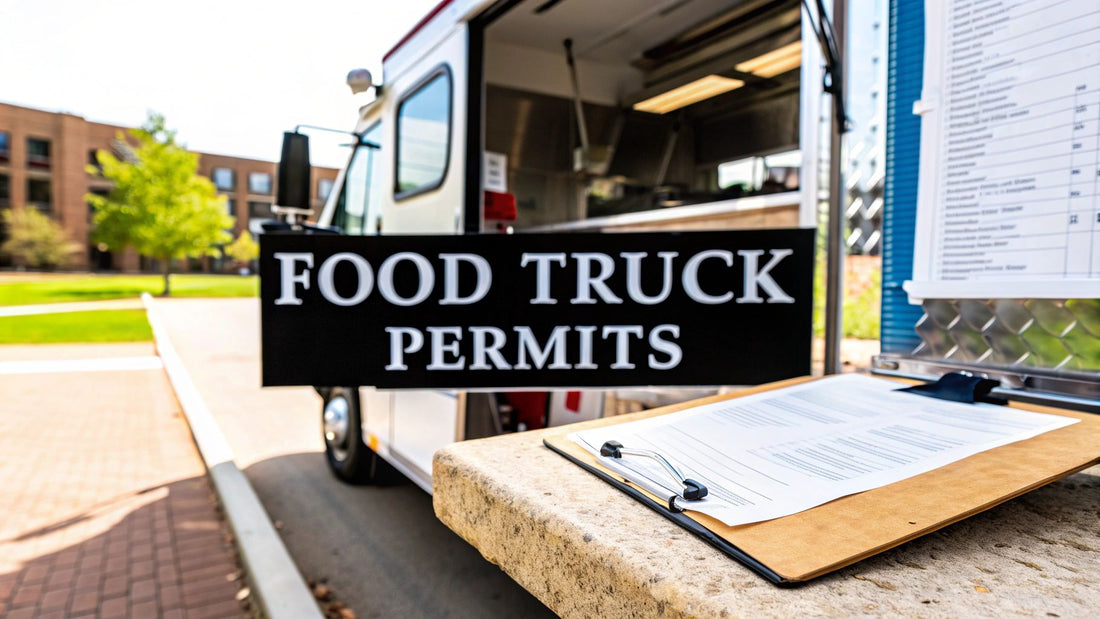
Mastering Food Truck Permit Requirements: A Guide for Chefs and Owners
Share
Getting all the right food truck permit requirements in place is a journey, not a single step. For restaurant owners and chefs venturing into the mobile food world, it’s a new landscape of regulations. You're looking at a combination of licenses: a business license, a health department permit, and a mobile food vendor permit, at a minimum. The tricky part? The exact rules change dramatically from one city or county to the next, which means your first job is to become an expert on your local regulations. This guide will help you stay informed and navigate the process, just as you stay on top of industry trends and the latest deals on restaurant equipment.
Your Essential Food Truck Permit Roadmap
There’s a ton of excitement that comes with launching a food truck, but all that culinary creativity rests on a solid foundation of legal paperwork. Before you start planning your menu or designing a killer truck wrap, you have to work your way through the maze of local and state rules. This isn't just about dodging fines; it’s about building a legitimate business that customers and event organizers trust.
I’ve seen too many new owners get sidelined because they underestimated this part of the process. They assume one or two licenses are all they need, but the reality is far more complex. A food truck is a unique beast—it's both a restaurant and a commercial vehicle, and the government has rules for both. Nailing down this initial planning is just as critical as choosing the right fryer. To get the full picture of how this fits into your overall strategy, our guide on crafting a detailed food truck business plan is a must-read.
The Core Permit Categories
No matter where you plan to park and serve, your permit requirements will almost always fall into three main buckets. Each one is designed to ensure your operation is safe, legal, and ready for business.
- Business Registration and Licensing: This is where you officially become a business. You’ll register your name, decide on a legal structure (like an LLC or sole proprietorship), and get a general business license from your city. It’s the foundational piece of the puzzle.
- Health and Safety Permits: These are non-negotiable. Your local health department will be your new best friend (or worst enemy). They issue the permits that prove your truck meets strict standards for food storage, sanitation, and preparation. This is also where fire department inspections come in, especially if you're using propane or any open flames.
- Vehicle and Vending Permits: This bucket covers everything related to the "mobile" part of your mobile food business. It includes your truck's commercial registration and, most importantly, the specific mobile food vendor permits that tell you where you can legally park and when you can sell.
To help you visualize where to begin, here's a simple, three-step look at the research process.
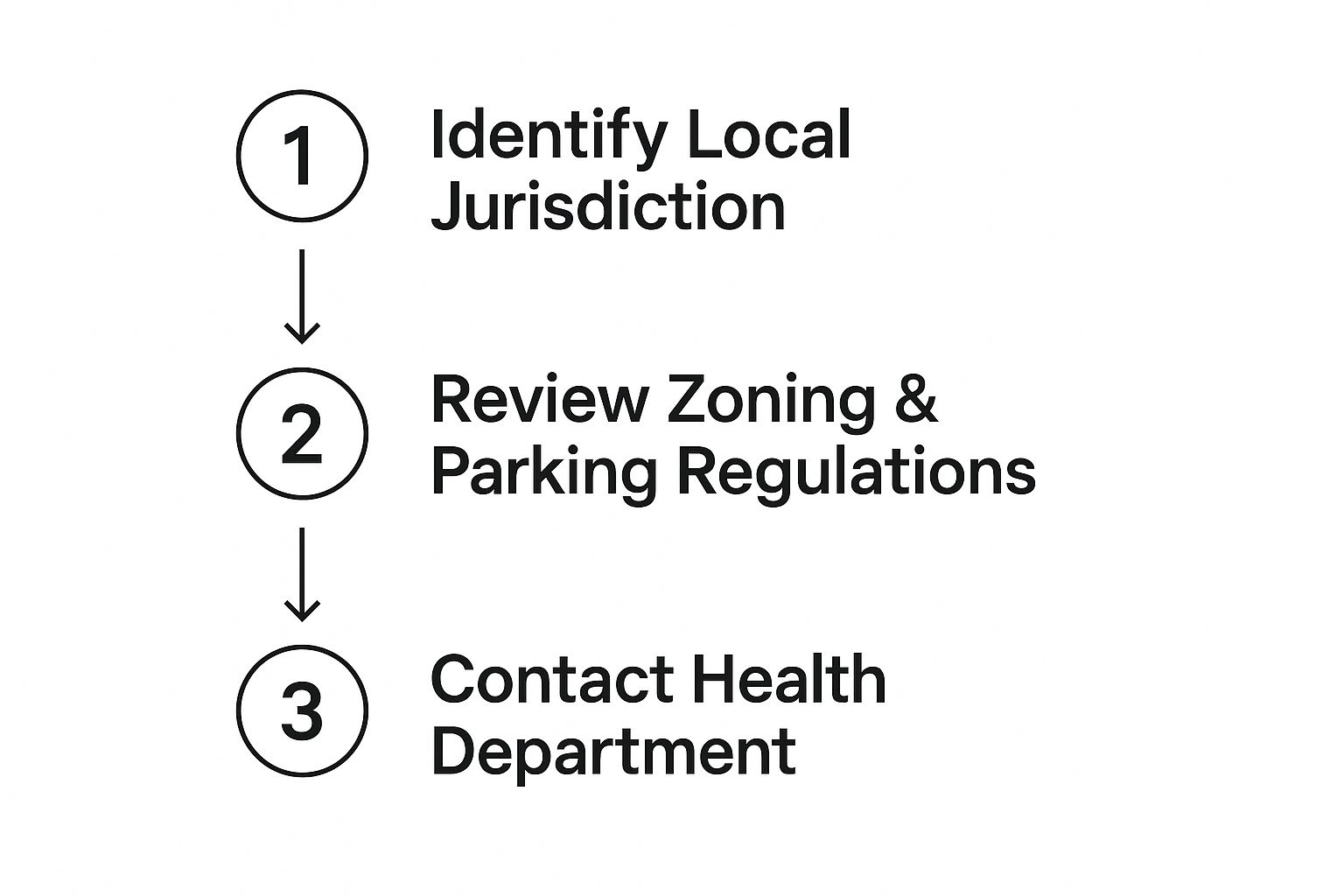
The takeaway here is simple but crucial: Start with your local jurisdiction. Figure out their specific rules before you even think about filling out a single application.
For a quick reference, let's break down the essential permits you'll likely encounter.
Core Food Truck Permit and License Overview
| Permit Type | Purpose | Issuing Authority |
|---|---|---|
| Business License | Legally establishes your company in a specific city or county. | City or County Clerk's Office |
| Health Permit | Certifies your truck meets food safety and sanitation standards. | County or City Health Department |
| Mobile Food Vending Permit | Grants you the right to operate and sell in designated public areas. | Varies (e.g., Department of Transportation, Business Licensing) |
| Fire Safety Permit | Confirms your cooking equipment and fire suppression systems are safe. | Local Fire Department |
| Food Handler's Permit | Required for all employees to demonstrate basic food safety knowledge. | County or City Health Department |
This table covers the big ones, but remember that your local area might have additional requirements, like specific commissary agreements or wastewater disposal plans. Always double-check with your local agencies to get the complete picture.
Getting Your Food Truck on the Road, Legally
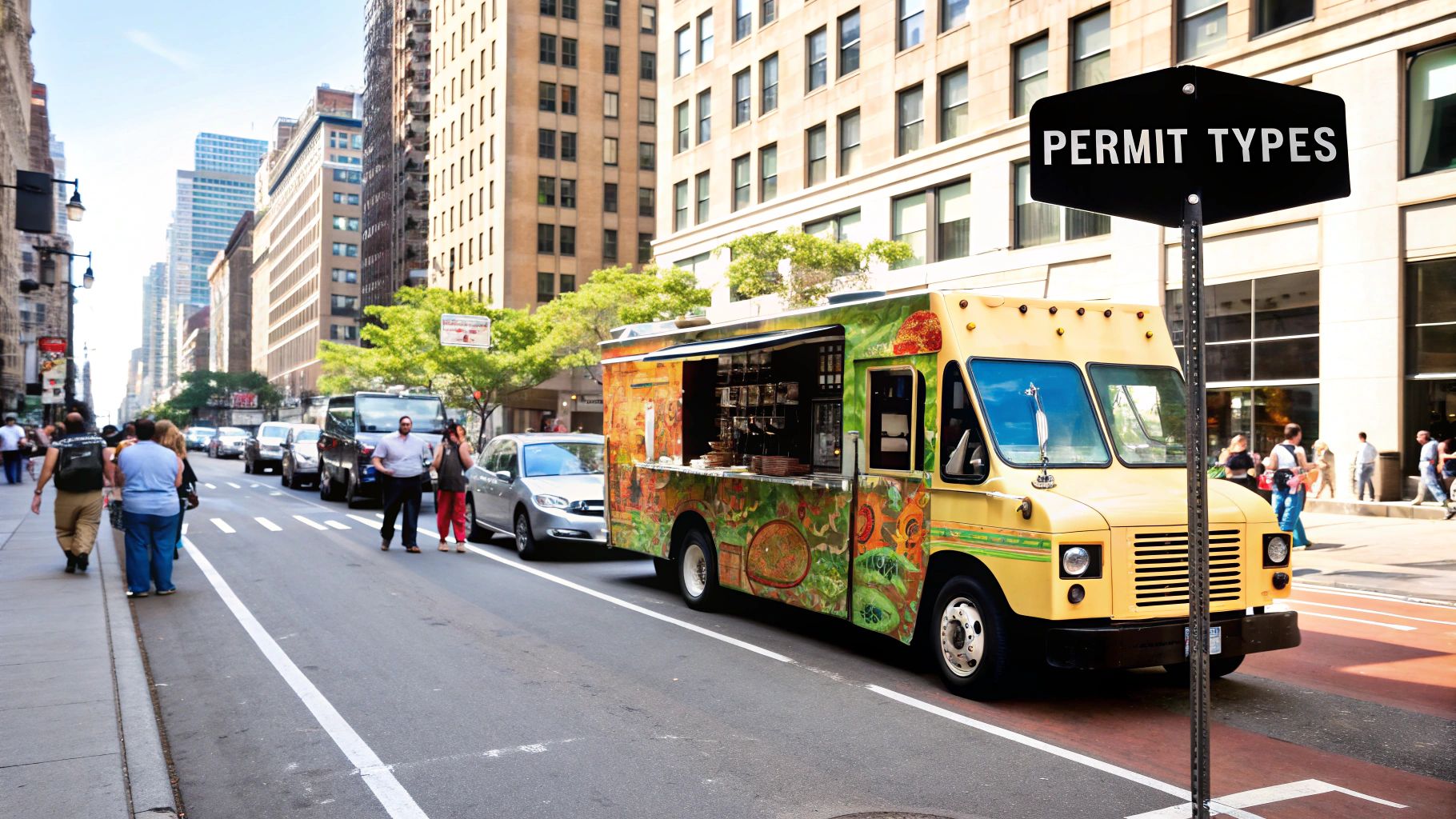
Before you can even think about firing up the grill, you have to turn your food truck idea into a legitimate business. This is the foundational stuff, the paperwork that builds a professional operation and, more importantly, protects you from personal risk.
Your first major decision is choosing a business structure. This choice directly affects your taxes and how much personal liability you’re taking on. It's a big deal.
A sole proprietorship is the simplest route. It's just you. The downside? There's absolutely no legal line between you and your business. If your taco truck gets sued, your personal assets—your house, your car, your savings—could all be on the line. It's an easy start, but it leaves you completely exposed.
That’s why most experienced owners will tell you to form a Limited Liability Company (LLC). An LLC creates a separate legal entity, a protective wall between your business and your personal life. If something goes wrong and the business faces a lawsuit, your personal assets are typically safe. That extra bit of paperwork up front buys you a whole lot of peace of mind down the road.
Nailing Down Your Federal and State IDs
Once you’ve picked a business structure, your next move is to get an Employer Identification Number (EIN) from the IRS. Think of it as a Social Security number for your business. It's free, and you can apply right on the IRS website.
You'll need an EIN for almost everything: opening a business bank account, hiring your first prep cook, and, of course, filing your taxes. Even if you're a one-person show, get one. It instantly makes your operation look more legitimate to banks, suppliers, and city officials.
With your EIN secured, there are two more non-negotiable pieces of paper you'll need:
- A City or County Business License: This is your basic permission slip to operate a business in your local area. It’s your official entry into the local economy.
- A Seller's Permit: Sometimes called a Sales Tax Permit, this comes from your state's tax agency. It gives you the legal authority to collect sales tax on all those delicious meals you sell. You'll then be responsible for sending that tax money back to the state, usually every quarter.
Your business license makes you a real local business, and your seller's permit keeps you on the right side of the state. You absolutely cannot operate without both.
Shielding Your New Venture
Okay, you've handled the basic permits. Now it's time to think about protecting your investment. You've poured your time, money, and heart into this truck. What happens if there's a kitchen fire, or a customer claims they got sick from your food?
This is where insurance steps in. You’ve insured the truck itself as a vehicle, but you also have to insure the business operating inside it. Securing essential business insurance for contractors is just as critical as any permit. It’s your financial safety net, protecting you from the immense costs of accidents, liability claims, and property damage that can pop up in the food industry.
Getting these legal and financial shields in place from day one is how you build a business that can not only thrive but also survive the unexpected bumps in the road.
Passing Your Health Department Inspection

This is it. After all the planning and building, this is the one moment that can make or break your food truck launch. The health department inspection is where the rubber meets the road—where your dream kitchen gets a reality check against a long list of public safety rules.
Don't underestimate this step. An inspector's sole job is to make sure you won't make people sick. They're not there to critique your fusion tacos, but they will absolutely scrutinize your sanitation, equipment, and every single process you have. Showing up with a solid grasp of food safety systems, like knowing your HACCP Critical Control Points, signals to the inspector that you're a professional who takes this seriously.
Passing isn’t just about being clean; it’s about being compliant. Your truck's entire layout, from the sinks to the fridge, must meet the exact letter of your local health code before you can even think about serving your first customer.
Your Lifeline: The Commissary
Before you can even schedule an inspection, you'll almost certainly need a signed commissary agreement. Think of a commissary as your home base—a licensed, commercial kitchen where you are legally allowed to do all the things you can’t do on the truck or at home.
This is where you'll prep food, store extra inventory, fill your fresh water tanks, and properly dispose of wastewater. Your home kitchen is completely off-limits for commercial food prep, period.
The health department will want to see your formal, signed agreement with an approved commissary. When you're shopping for one, make sure it has:
- Dedicated storage: You'll need secure dry and cold storage space that is yours and yours alone.
- Proper utilities: This means access to potable water and approved disposal stations for greywater and used cooking oil.
- Enough prep space: You need room to work efficiently without bumping elbows with other food businesses.
Have that signed commissary agreement ready to go. It’s often one of the first documents the inspector asks to see.
Inside the Inspector's Checklist
When that inspector shows up with their clipboard, they're not just looking around. They are following a very specific checklist, and knowing what’s on it is your biggest advantage. While the fine print varies by city and county, the big-ticket items are nearly universal.
The things that trip people up most often are surprisingly simple. Let’s talk about sinks, for example. This is a huge one. You absolutely must have a three-compartment sink for washing, rinsing, and sanitizing. On top of that, you need a separate, dedicated handwashing sink with its own hot and cold running water, soap, and paper towels. Trying to slide by with a creative sink setup is an automatic fail.
Water tanks are another classic rookie mistake. Your greywater tank (for wastewater) must be larger than your freshwater tank. The standard rule of thumb is at least 15% bigger. This is a non-negotiable design feature to prevent nasty overflows.
The health inspection is a test of your systems, not just your cleanliness. The inspector wants to see that your truck is designed and equipped to prevent foodborne illness from the moment an ingredient enters until a customer takes their first bite.
Beyond the plumbing, they will check every piece of equipment. Your refrigerators and cold-holding units have to maintain a temperature below 40°F. Your steam tables and other hot-holding equipment must keep food safely above 140°F. They’ll poke around your storage, checking for dated labels and ensuring you’re keeping raw meat on the bottom shelf, far away from ready-to-eat foods.
Finally, make sure every single person on your team has their Food Handler's Permit. Keep copies of those certifications in a binder on the truck. Passing on the first try saves you from paying re-inspection fees and, more importantly, gets you out on the street making money that much faster.
Navigating Vehicle and Vending Zone Rules
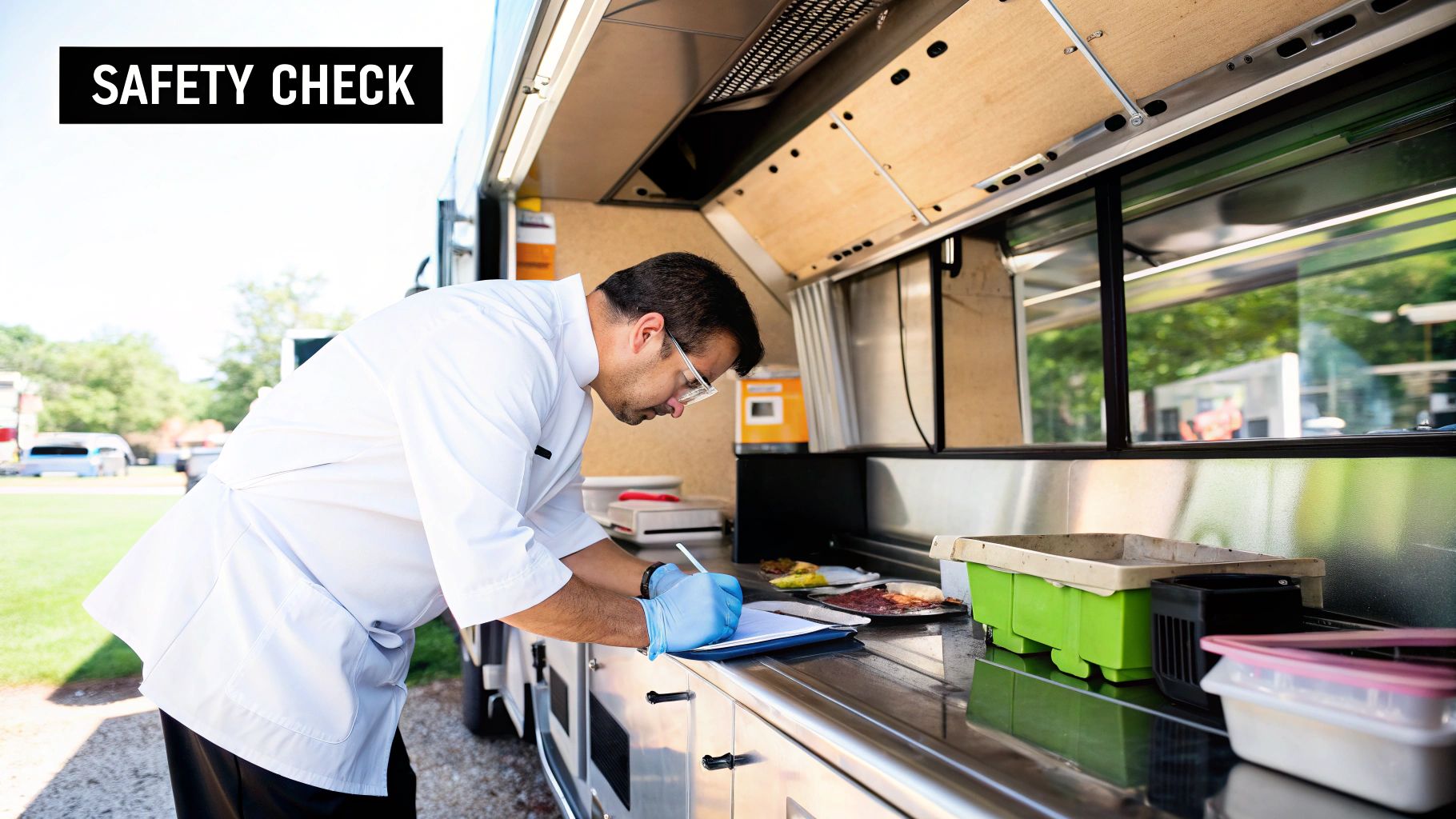
One of the first things you'll realize is that your food truck leads a double life. It's both a commercial kitchen and a commercial vehicle, which means you have to answer to two completely different sets of regulators: the city’s zoning department and the DMV. This dual identity is where a lot of new owners get tripped up by a unique web of food truck permit requirements.
Let's start with the vehicle part. Your standard driver's license won't cut it. Your truck has to be registered as a commercial vehicle, and that comes with its own set of fees, higher insurance minimums, and more rigorous inspections than your personal car. Depending on your state, you might even run into specific weight class or emissions rules for mobile kitchens. A trip to the DMV should be one of the very first things on your to-do list.
Decoding Where You Can Legally Park and Sell
Getting the truck registered is actually the easy part. The real headache? Figuring out where you’re legally allowed to park and sell food. This is where you get into a tangled mess of hyper-local rules that can literally change from one block to the next.
Don't make the rookie mistake of just pulling into a great-looking parking spot. That's a surefire way to get a ticket that will eat up your profits. Cities control where mobile businesses can operate through designated vending zones, and your success depends on becoming an expert on your local zoning map.
You need to dig into the details:
- Approved Vending Locations: Are there specific streets, parks, or lots where food trucks are welcome? Do you need to reserve a spot in advance or pay a daily fee?
- Hours of Operation: Many zones are time-sensitive. You might only be allowed to operate during the lunch rush (say, 11 a.m. to 2 p.m.) and be banned from parking overnight.
- Proximity Rules: This is a huge one. Cities are protective of their brick-and-mortar businesses. You’ll often find rules stating you must be at least 200 feet from the front door of a restaurant or a certain distance away from schools.
These regulations are all about balancing the fun and energy of food trucks with public safety and the interests of established local businesses. Ignoring them is the fastest way to make an enemy out of a code enforcement officer.
The best food truck spots aren't found by luck. They're the result of painstaking research into local vending laws and a deep understanding of the specific restrictions tied to every potential location.
Fire Safety and Clearance Regulations
Beyond where you can park, the fire department has its own set of non-negotiable rules. These are all about public safety and ensuring emergency crews can do their jobs, so they are taken very seriously.
You can expect to find strict clearance requirements. For example, you’ll almost certainly be prohibited from setting up shop within a certain distance of fire hydrants, building exits, or residential driveways. This ensures that in a real emergency, fire trucks and paramedics have unobstructed access.
The layout of your truck and the systems you install are a huge part of this. For a closer look at what you’ll need, check out our guide on essential kitchen equipment for food trucks, as your compliance often starts with your build-out.
Before you even think about firing up the grill, go to your potential spots with a tape measure. Are you really 15 feet from that hydrant? Is there plenty of room for a wheelchair or stroller to get by on the sidewalk? Thinking like an inspector from day one will save you a world of headaches, from expensive fines to being forced to move in the middle of a busy lunch service.
Staying Compliant All Year Long
Getting that first stack of permits is a huge win, but let's be real—that’s just the starting line. The real test of a successful food truck business isn't just getting legal; it's staying legal, month after month. This is the part of the game that separates the pros from the people who get slapped with a "closed" sign during a surprise inspection.
Think of your permits less like a one-and-done purchase and more like subscriptions you have to keep active. Your business license, health permit, and fire safety certificate don't sync up; they all have their own expiration dates. Letting just one of them lapse can get you shut down on the spot. Suddenly, your busiest Friday night of the month turns into zero revenue and a lot of headaches.
Build a Compliance Calendar
The easiest way to avoid that kind of stress is to get organized from day one. You don't need some complex, expensive software for this. A simple digital calendar with reminders is your best friend here.
The moment you get a permit, plug its renewal date into your calendar. But don't just set one reminder. Set three for each and every permit:
- 90 days out: This is your early warning. Time to look up the latest renewal process and see if fees have changed.
- 30 days out: Go-time. Start pulling together the paperwork and filling out those applications.
- 7 days out: Final check. Follow up to make sure the agency got everything they need from you.
Doing this turns compliance from a frantic, last-minute panic into just another part of running your business. A good small business compliance checklist can also be a lifesaver for keeping track of all your ongoing duties.
Meticulous Records Are Your Best Defense
Beyond just renewing licenses, your daily paperwork is your shield against a tough health inspection. I've seen it time and time again: inspectors are impressed by good documentation. It shows them you're committed to safety, even when they aren't standing there watching.
Make your daily logbook a non-negotiable habit. It should include temperature logs for every cooler and freezer, notes on when you completed cleaning tasks, and your commissary manifests to prove you're disposing of waste and greywater correctly. This logbook is as crucial as your insurance policy. And on that note, keeping your coverage up-to-date is a non-negotiable part of compliance. You can dive deeper into that in our guide to mobile food vendor insurance.
A well-kept logbook tells a health inspector a story of professionalism. It proves that safety isn't just something you do before an inspection—it's baked into your daily routine.
Common Questions About Food Truck Permits
When you're wading through the paperwork for a new food truck, a few questions always seem to pop up. Getting straight answers to these early on can save you a world of headaches (and a decent amount of cash). Let's dig into some of the most common things that trip people up.
One of the biggest questions I hear is about the timeline. People see a simple online form and think it'll be quick, but the reality is a bit more complicated.
How Long Does It Really Take To Get All Food Truck Permits?
You need to brace yourself for a 3-to-6-month timeline. That’s the realistic window from starting your first application to getting the final green light.
Sure, getting your EIN from the IRS is instant. But the big ones—your health department permit and the city business license—are slow dances. They involve multiple steps, back-and-forth emails, and waiting for someone else’s schedule to clear. My best advice? The second you know you're buying a truck, start the paperwork. Don't wait. Procrastination here will absolutely delay your grand opening.
Another thing that often confuses new owners is whether they can take their truck to a festival in the next town over. The short answer is almost always no.
Health permits, business licenses, and local vending permits are intensely local. They are tied to a specific city or county and do not travel with you. If you want to operate in a neighboring city, you have to go through their entire permitting process from scratch.
What Is the Number One Reason Food Trucks Fail Inspection?
Hands down, it's the plumbing and water systems. An experienced inspector can spot a shoddy water setup in about ten seconds, and it’s an automatic fail.
Here are the classic mistakes that will get you sent home:
- No dedicated handwashing sink: You absolutely cannot wash your hands in one of the three-compartment sinks. You need a completely separate sink, with its own hot and cold water, just for handwashing.
- A weak water heater: Your heater has to be strong enough to pump out continuous hot water to every single sink at the same time. No exceptions.
- Wrong water tank ratio: This one is crucial. Your wastewater tank (or greywater tank) must be at least 15% larger than your freshwater tank. This prevents disgusting and hazardous overflows, and inspectors check it every time.
Seriously, spending the money to have your plumbing professionally designed and installed is one of the smartest moves you can make. It's an investment that pays for itself the first time you pass inspection without a hitch.
At Encore Seattle Restaurant Equipment, we help restaurant owners and chefs discover the latest news and exclusive deals on restaurant equipment and supplies. From NSF-certified refrigeration to commercial-grade cooking stations, we have everything you need to build a compliant and efficient kitchen on wheels. Stay informed about industry trends and get your dream truck rolling by visiting us at https://encoreseattle.com.
